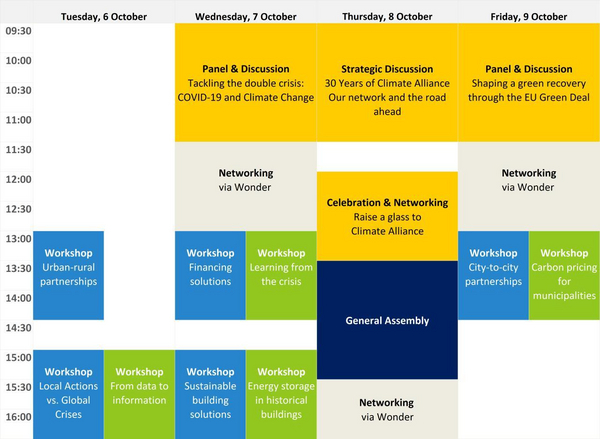Digital Days Programme
Here you will find a general overview of sessions held throughout the Climate Alliance Digital Days from 6 to 9 October, 2020 as well as related material.
6 October: Workshops
Urban-rural partnerships – Key to the energy transition
6 October, 13:00 to 14:30
A greener Europe means that local and regional authorities will have to increase the share of renewables in their production and consumption mix. This workshop explored how they can join forces with rural communities to create renewable energy partnerships, helping cities meet demand for renewables from reliable, regional supplies while strengthening economic resilience in rural communities.
Materials:
- Anne-Marie Cabon, Brest (FR) | Presentation (PDF)
- John Green, Plymouth (GBR) | Presentation (PDF)
- Katrin Leuenberger, Infrastruktur & Umwelt, Darmstadt and Potsdam (DE) | Presentation (PDF)
Organised by the Climate Alliance project team RegEnergy.
Local actions vs. global crises – How cities can act
6 October, 15:00 to 16:30
The current crises require bold responses that address social, ecological and democratic challenges. Trade prioritising profit over human rights and the environment cannot be a part of the solution.Yet the EU-MERCOSUR agreement, an affront to Climate Alliance’s goals, is currently being discussed. This workshop explored what local authorities can do to fight negative social and environmental impacts.
Materials:
- Madlie Le Bihan & Tatjana Veith, Climate Alliance | Presentation (PDF)
- Graphical Recording
Further information (PDF)
Organised by the Climate Alliance campaign team Change the Power – (Em)Power to Change.
From data to Information – How data can support municipal climate policy
6 October, 15:00 to 16:30
The digital society generates plenty of data, much of it available at the local level and useful for municipalities. This workshop explored how data can be transformed into useful information for the development and communication of local climate policy. Examples like that of the Movebis project, which uses smart mobile data for the municipal transport planning, were examined.
Materials:
- Miguel Morcillo, Climate Alliance | Presentation (PDF)
- Sven Lißner, TU Dresden (DE) | Presentation (PDF)
- André Muno, Climate Alliance | Presentation (PDF)
Further information (PDF)
7 October: Discussion and workshops
Tackling the double crisis – COVID-19 and climate change
7 October, 09:30 to 11:30
The Corona pandemic has revealed structural weaknesses and underlying problems in our societies. At the same time, it has also resulted in a show of ingenuity, readiness to take previously unthinkable decisions, solidarity and the ability to cope by governments and people across the globe. In this session, we discussed what we have learned during the past months and how to take these lessons forward in tackling both the COVID-19 and the climate crisis head on.
Materials:
- Dr Alice McGushin, Lancet Countdown | Presentation (PDF)
- Thomas Brose, Climate Alliance | Presentation (PDF)
Further information (PDF)
Financing solutions for sustainable climate investments
7 October, 13:00 to 14:30
The Corona crisis has made implementing local climate protection and adaptation measures especially challenging. At the same time, financing solutions for measures mitigating the pressures of the climate crisis are more critical now than ever before as they are the only way for municipalities to maintain or improve resiliency. This workshop inspired with examples from across Europe.
Materials:
- Tatjana Veith, Climate Alliance, & Luigi Acquaviva, San Giuseppe Vesuviano (IT), EUCF | Presentation (PDF)
- Luc Wittebolle, SuMa Consulting (BEL) | Presentation (PDF)
- Torben Esbensen, Project Zero Sonderborg (DK) | Presentation (PDF)
Further information (PDF)
Organised by the Climate Alliance Working Group on Financing and the Climate Alliance project teams FALCO and EUCF.
Learning from the crisis – An integrated approach to shocks and climate change
7 October, 13:00 to 14:30
The COVID-19 crisis has highlighted the crucial role municipalities play in protecting their citizens from a range of shocks. Over the past months, local governments have shown their ability to react to new situations and support their citizens. This session reflected on lessons learned throughout the pandemic. How do they apply to work on climate change adaptation and addressing multiple crises in parallel?
Materials:
- Ingrid Konrad, Bratislava (SVK) | Presentation (PDF)
- Ana Romero Càlix, Barcelona Metropolitan Area (ES) | Presentation (PDF)
Further information (PDF)
Organised via the Climate Alliance Working Group on Adaptation.
Sustainable building solutions for the EU Renovation Wave
7 October, 15:00 to 16:30
The workshop was an opportunity to empower municipalities with findings and tools to upscale building renovation and contribute to the EU Renovation Wave. The workshop examined two powerful tools that enable municipalities to take direct action on their local building stock: (i) the setup of local One-Stop-Shops to bring together the supply and demand side of building renovation, and (ii) a monitoring impact framework to track progress on local building renovation and inform decision-making.
Further information (PDF)
Organised by the Climate Alliance project teams Padova Fit Expanded and Build Upon2.
Energy Storage in historical urban buildings
7 October, 15:00 to 16:30
What potential do energy storage systems offer in buildings or neighbourhoods and how can energy efficiency measures be implemented in listed buildings of historical value? Through examples such as Austria’s Weizberg Basilica and with the help of a specialised tool, this workshop explored opportunities and challenges of energy storage in listed buildings.
Organised by the Climate Alliance project team Store4HUC.
8 October: Discussion and celebration
30 Years of Climate Alliance – Our network and the road ahead
8 October, 09:30 to 11:30
Clear and ambitious targets is a prerequisite for effective climate action. Since Climate Alliance’s founding 30 years ago, CO2 reduction targets have become mainstream at all levels and sectors. Yet such targets are only a starting point. In this session, we discussed the role of climate targets for municipal climate action using Climate Alliance’s 2019 Net-Zero discussion paper as a basis. How do members approach the wide variety of climate targets and translate them into concrete action? What should the role of our network be going into the future?
Materials:
- Bernd Schott, Tübingen (DE) | Presentation (PDF)
- Graphical Recording
- Session Results (PDF)
30 Year Journey – Raise a glass to Climate Alliance
8 October, 12:00 to 13:30
2020 is both a special and decisive year – for global climate action as well as for Climate Alliance. Our 30th anniversary is also the ideal occasion to reflect on our network’s path. With this session we wanted to share impressions of the beginnings of Climate Alliance but also look forward. After about half of the time we raised our glasses to 30 years of Climate Alliance and offered the opportunity for informal exchange among the participants.
Materials:
- Sarah Mekjian, Climate Alliance | Presentation (PDF)
- Alexander Hetjes, Mayor of Bad Homburg (DE) | Video Message
- Word Cloud "What do you associate with 30 years of Climate Alliance"
9 October: Discussion and workshops
Shaping a Green Recovery through the EU Green Deal
9 October, 09:30 to 11:30
The EU may have presented it’s new Green Deal before the Corona crisis hit, but its function now must be to ensure that cities are even better equipped to tackle the ongoing climate emergency than they were before the pandemic. Will the EU focus its recovery efforts on building a better, greener Europe or will it waste this opportunity by entrenching outdated business-as-usual models? How can the EU Green Deal support the energy and climate transition already underway at the local level? This session explored the current window of opportunity for much needed systemic change and what the EU is making of it.
City-to-city partnerships for the promotion of local climate protection
9 October, 13:00 to 14:30
City-to-city partnerships in the field of climate action can inspire creative ideas, involve new actors and help implement projects. Such partnerships can have an impact at both the political and administrative levels while providing points of contact for civil society. After exploring the significance of city partnerships for climate action and Climate Alliance, participants learned how French and German municipalities have benefited from such partnerships via the TANDEM project and were informed about Karlsruhe's partnership with the City of Kampala in Uganda. Participants were inspired how to revive or intensify their own town twinning activities through thematic cooperation.
Materials:
- Thomas Brose, Climate Alliance | Presentation (in German, PDF)
- Katharina Reinholz, City of Karlsruhe (DE) | Presentation (in German, PDF)
- Peter Schilken, Energy Cities | Presentation (in German and French, PDF)
Further information (in German, PDF)
Organised by the Climate Alliance project team TANDEM.
Carbon pricing at the municipal level
9 October, 13:00 to 14:30
Putting a price on carbon emissions could be called the holy grail of climate politics. Calculating in the social and environmental costs of the energy and products we use so as to include these costs in municipal planning, cost-benefit analyses and procurement would dramatically change our world. Many Dutch municipalities are already making use of carbon pricing. This workshop discussed how we can develop an EU carbon pricing model for municipalities based on this experience.
Materials:
- Thijs de la Court, Klimaatverbond (NL) | Presentation (PDF)
- Hester Keesmaat, City of Amsterdam (NL) | Presentation (PDF)
Further information (PDF)
Organised by the Climate Alliance Working Group on CO2 Monitoring.


